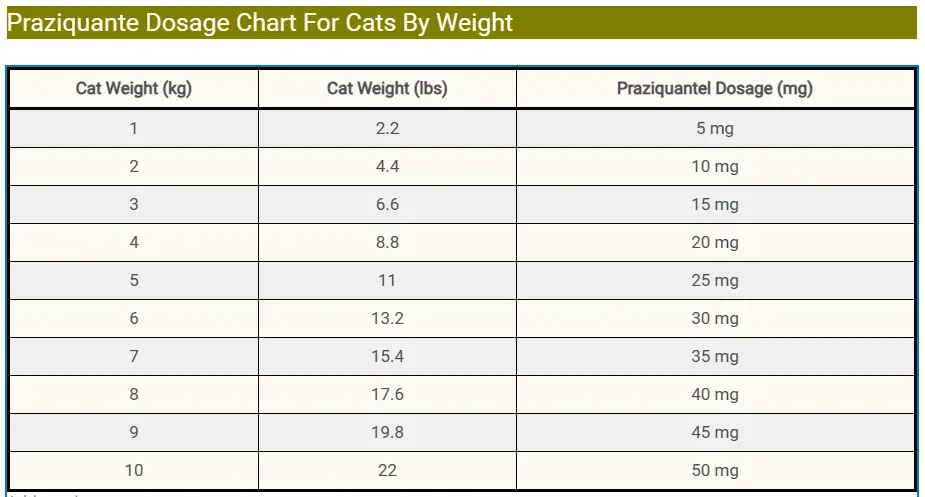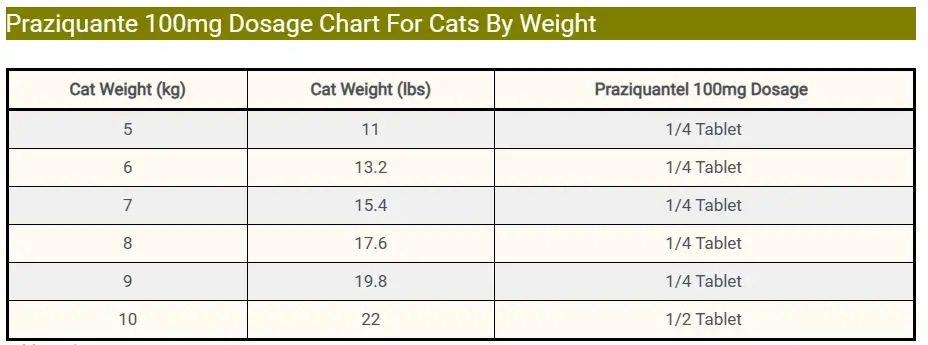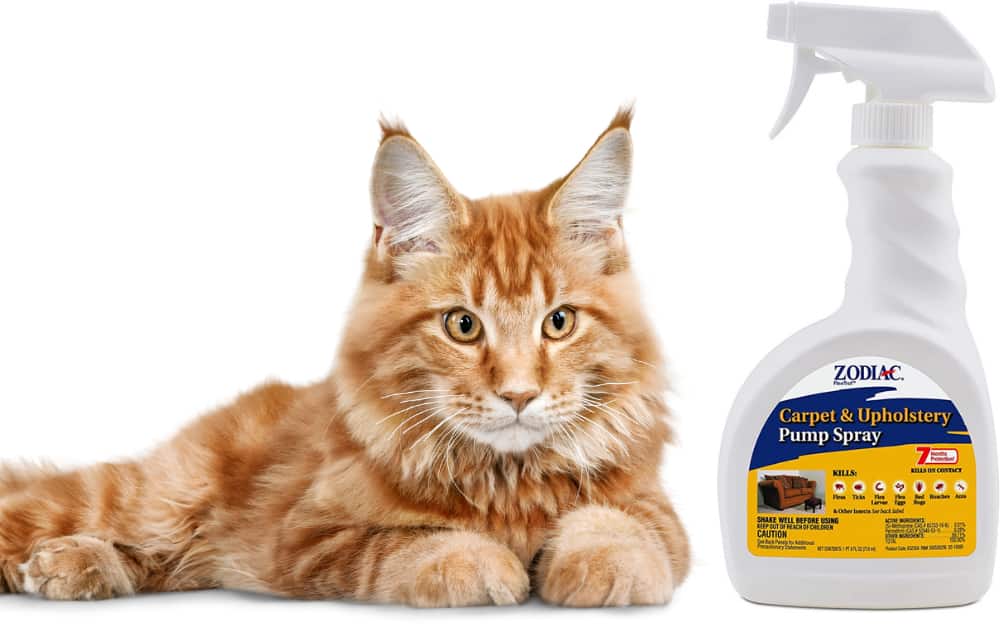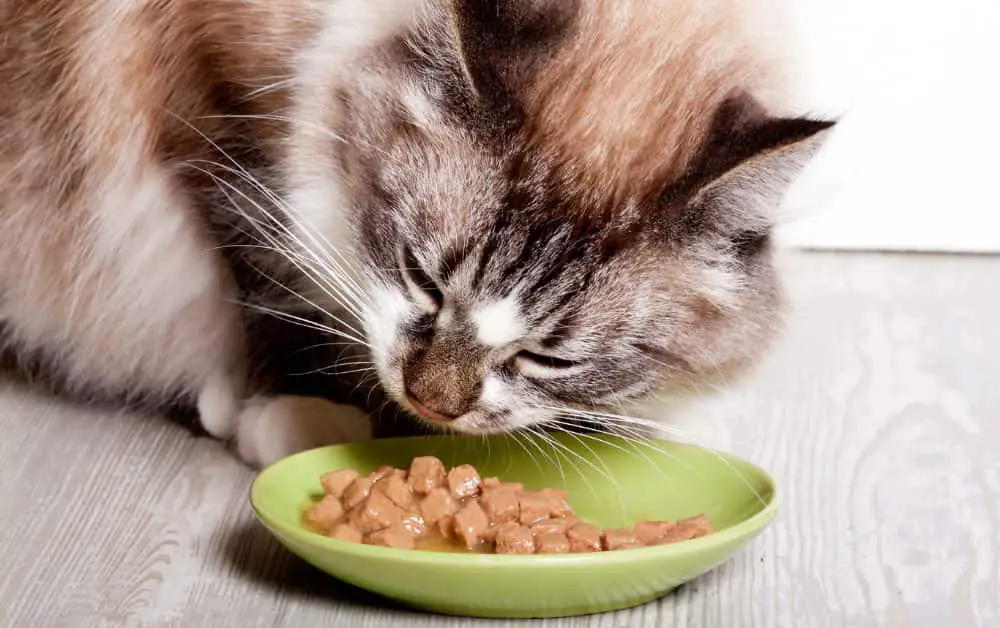The ideal dosage of Praziquantel for cats to treat gastrointestinal parasitosis is 5 mg/kg. This translates to giving a quarter of a 100mg Praziquantel tablet for every 5 kg of the cat’s weight, administered orally once daily. Administer the total calculated dose of the Praziquantel in a single dose. Repeat the treatment after 15 days. Additionally, a systematic or preventive deworming plan with the medication can be implemented every 60-90 days to maintain the cat’s health and prevent parasitic infestations.
Praziquantel Dosage For Cats

-
Ideal Dose: 5.5 mg/kg (2.5 mg/lb).
-
Uses: For the control of gastrointestinal parasitosis.
-
FDA Approved: Yes
-
Brand Names: Droncit®, Drontal®, Biltricide®, Bio-Cest®, Cercon®, Cesol®, Cestox®, Cisticid®, ComboCare®, Cysticide®, Ehliten®, Equimax®, Extiser Q®, Mycotricide®, Opticide®, Quest Plus®, Praquantel®, Prasikon®, Prazite®, Prozitel®, Sincerck®, Teniken®, Virbantel®, Waycital®, or Zifartel®, and Zimecterin
-
Variants: Tablets.
-
Storage & Handling: Store below 25 degrees Celsius, protected from light, in a hygienic place.
-
Administration: Once Daily. Single Dose
Disclaimer: Self-medication can be hazardous. Please consult your veterinarian for personalized guidance on the appropriate dosage for your feline friend specific condition.
As responsible pet owners, ensuring the health and well-being of our feline companions is paramount. One aspect of cat care that often requires attention is parasite control, and praziquantel stands out as a crucial tool in this endeavor.
From tapeworms to flukes, parasitic infections can wreak havoc on a cat’s health if left unchecked. Understanding the appropriate dosage and administration of praziquantel is essential for effectively combating these pests and safeguarding the health of our beloved feline friends.
This comprehensive guide delves into the intricacies of praziquantel dosage for cats, providing insights and recommendations to empower pet owners to protect their furry companions from parasitic infestations.
Praziquante Dosage For Cats
The recommended dosage of praziquantel for cats can vary depending on factors such as the specific formulation of the medication and the cat’s weight. However, a typical dosage range is 5.5 mg/kg (2.5 mg/lb) of body weight, typically administered orally.
Administer the total calculated dose of the product in a single dose. Repeat the treatment after 15 days.
However, a systematic or preventive deworming plan can be implemented every 60-90 days to maintain the health of the feline and prevent parasitic infestations.
It’s essential to follow the instructions provided by your veterinarian or on the medication label carefully to ensure safe and effective treatment.
Consulting with a veterinarian is crucial to determine the appropriate dosage for your cat’s specific condition and needs.
Praziquante Dosage Chart For Cats By Weight
| Cat Weight (kg) | Cat Weight (lbs) | Praziquantel Dosage (mg) |
|---|---|---|
| 1 | 2.2 | 5 mg |
| 2 | 4.4 | 10 mg |
| 3 | 6.6 | 15 mg |
| 4 | 8.8 | 20 mg |
| 5 | 11 | 25 mg |
| 6 | 13.2 | 30 mg |
| 7 | 15.4 | 35 mg |
| 8 | 17.6 | 40 mg |
| 9 | 19.8 | 45 mg |
| 10 | 22 | 50 mg |
The above Praziquante dosage chart for cats by weight is provided for educational purposes only and should not substitute for veterinary advice. Always start with the minimum dose for you feline until your vet prescribes an increase in dosage.
Praziquante 100mg Dosage Chart For Cats By Weight
| Cat Weight (kg) | Cat Weight (lbs) | Praziquantel 100mg Dosage |
|---|---|---|
| 5 | 11 | 1/4 Tablet |
| 6 | 13.2 | 1/4 Tablet |
| 7 | 15.4 | 1/4 Tablet |
| 8 | 17.6 | 1/4 Tablet |
| 9 | 19.8 | 1/4 Tablet |
| 10 | 22 | 1/2 Tablet |
Related Post: Clindamycin Dosage For Cats
Praziquante Uses in Cats
Praziquantel is commonly used in felines to treat various parasitic infections, particularly those caused by tapeworms. These parasites can infect cats through ingestion of contaminated food, water, or intermediate hosts like fleas and rodents.
Here are some key uses of praziquantel in cats:
-
Treats tapeworm infections caused by Dipylidium caninum, Taenia spp., and Echinococcus multilocularis.
-
Effective against schistosomiasis (schistosome infections) in felines.
-
Occasionally used off-label for liver fluke infections (Fasciola hepatica).
-
Included in some heartworm prevention products for additional parasite control.
-
Can treat bilharzia (schistosomiasis) in cats caused by certain blood fluke species (Schistosoma).
Related Post: Apoquel Dosage For Cats
Praziquante Side Effects in Cats
-
Vomiting: Cats may experience vomiting as a reaction to Praziquantel.
-
Diarrhea: Another common side effect is diarrhea.
-
Lethargy: Cats might appear tired or lethargic after taking Praziquantel.
-
Loss of Appetite: Some cats may lose interest in food temporarily.
-
Drooling: Excessive drooling can occur as a side effect.
-
Tremors: In rare cases, tremors or shaking may be observed.
-
Allergic Reaction: Allergic reactions such as itching, swelling, or difficulty breathing can occur, although they are rare.
Which Cats Should Not Take Praziquante.
Felines with the following health issues should not take Praziquante, Cleocin® without veterinary recommendations.
-
Felines with a known hypersensitivity or allergy to Praziquantel or its ingredients.
-
Cats with severe liver or kidney disease, unless under close veterinary supervision.
-
Pregnant or nursing cats, unless prescribed and deemed necessary by a veterinarian.
-
Do not administer in weakened felines, or in situations of intense stress.
FAQs
What is the recommended dosage of Praziquantel for cats?
The recommended dosage of Praziquantel for cats varies depending on factors such as weight and the type of parasite being treated. Your veterinarian will provide specific dosage instructions based on your cat’s needs.
Can Praziquantel be given to kittens?
Praziquantel can be safely administered to kittens, but the dosage may need to be adjusted based on age and weight. It’s essential to consult with your veterinarian before deworming kittens.
How often should I deworm my cat with Praziquantel?
The frequency of deworming with Praziquantel depends on various factors, including your cat’s lifestyle and risk of parasite exposure. Your veterinarian can recommend a deworming schedule tailored to your cat’s needs.
Are there any natural alternatives to Praziquantel?
While some natural remedies may have deworming properties, pharmaceutics are more effective or reliable than more effective and reliable. It’s best to consult with your veterinarian before using any alternative treatments.
Can Praziquantel be given to pregnant cats?
Praziquantel can be administered to pregnant cats under the guidance of a veterinarian. However, special precautions may be necessary, so it’s essential to consult with your veterinarian before administering any medications during pregnancy.












